Herbalist Dr MziziMkavu
JF-Expert Member
- Feb 3, 2009
- 42,322
- 33,127
By Gerri Peev and Tom Kelly
Last updated at 12:58 PM on 21st February 2011
More than 300 people have been killed in the unrest after Gaddafi was reported to have contracted foreign mercenaries to quell the most violent protests in his 41-year reign.
Dozens more were reported killed in Tripoli overnight with army units reportedly defecting to the opposition and protesters claiming to have taken control of the second city Benghazi.
As Europe and the U.S. condemned the violence, BP said it planned to evacuate its expatriate staff from Libya while Gaddafi's son Saif said his family would 'fight until the last bullet'.
Scroll down to watch a video report of the unrest in Libya

Defiant: Saif al-Islam, son of Libyan leader Muammar Gaddafi, said he would would enforce security at any price as unrest continues

Massacre: More than 300 pro-democracy demonstrators have been killed in Libya

Mass movement: Protesters assemble in Benghazi as the fighting continues
More than 300 victims have been massacred many by foreign mercenaries during the government crackdown in Libyas second city, Benghazi.
Protesters were gunned down in the streets, with reports that helicopter gunships and snipers were used to suppress the uprising.
The state TV headquarters in the capital Tripoli were also damaged during protests on Sunday while the AFP news agency reported several public buildings had been set alight.
Saif al-Islam Gaddafi, the dictator's son, gave a defiant address on state television last night saying his family's 'spirits are high' and warning: 'We will eradicate them [enemies] all'.
He said Libya's oil reserves would be 'burned by thugs, criminals, gangs and tribes' and said the populace would be left in poverty.
Libyan protesters and security forces battled for control of Tripoli's city centre overnight, with snipers opening fire and Muammar Gaddafi supporters shooting from speeding vehicles, witnesses have said.
The protests appear to be the heaviest in Libya's capital after days of deadly clashes in eastern cities.
'FIGHT UNTIL THE LAST BULLET'
The son of Colonel Gaddafi warned that continued anti-government protests could lead to a civil war that could send Libya's oil wells up in flames.
Appearing on Libyan state television after midnight on Sunday, Saif Gaddafi said the army still backed his father, although he added that some military bases, tanks and weapons had been seized.
'We are not Tunisia and Egypt,' the son said.
'We will fight to the last minute, until the last bullet.
'We will keep fighting until the last man standing, even to the last woman standing...We will not leave Libya to the Italians or the Turks.'
He acknowledged that the army made mistakes during protests because it was not trained to deal with demonstrators.
But he added that the number of dead had been exaggerated, giving a death toll of 84.
Saif Gadhafi offered to put forward reforms within days that he described as a 'historic national initiative' and said the regime was willing to remove some restrictions and begin discussions for a constitution.
He offered to change a number of laws, including those covering the media and the penal code.
Three witnesses say protesters moved into Tripoli's central Green Square and nearby squares last night. Plain-clothes security forces and militiamen attacked in clashes that lasted until dawn.
One witness said snipers opened fire from rooftops. Two others said gunmen in vehicles with photos of Col Gaddafi sped through, opening fire and running people over. The witnesses reported seeing casualties, but the number could not be confirmed.
It has also been reported that 17 were wounded when Libyans stormed a South Korean-operated construction site 18 miles from the capital, with two Bangladeshi workers stabbed.
BP says it is 'very likely' some of the oil company's employees in Libya will be evacuated in the coming days as the violent unrest in the north African country spreads.
A spokesman for BP PLC said the company is drawing up plans for evacuating staff 'in the next couple of days'.
BP has about 140 employees in the country, of which less than a third are expatriates, spokesman David Nicholas said.
British Prime Minister David Cameron, as he flew into Egypt on a surprise visit, launched an angry attack on the treatment of protesters in Libya.
Our message, as it has been throughout this - I think we have been extremely consistent in saying that the response to the aspirations people are showing on the streets of these countries must be one of reform not repression,' he said.
We can see what is happening in Libya which completely appalling and unacceptable as the regime is using the most vicious forms of repression against people who want to see that country - which is one of the most closed and one of the most autocratic - make progress.
The response they have shown has been quite appalling.
The worst unrest of Gaddafis 41-year rule comes seven years after Tony Blairs controversial Deal in the Desert, when the Labour Prime Minister ushered Libya in from the cold in exchange for billions in British business deals.
Britain has faced growing condemnation over its courting of Gaddafi after the Libyan dictator ordered the slaughter of hundreds of his own people.
The United Nations and the U.S. Ambassador to London questioned the UKs cosy trade links with Tripoli yesterday.

Firepower: Guns and rocket grenades on the streets of Benghazi yesterday

Iron fist: Colonel Gaddafi, appearing yesterday on state television, is accused of ordering the slaughter of his own people

City on fire: Al-Bayda local council building ablaze in Libya's third biggest city Al-Bayda

Call for change: Placards in Arabic read at top left 'Strike, strike until the fall of the regime', and at top right 'The people want to topple the regime'
British weapons are believed to have been used to murder more than 300 Libyan pro-democracy demonstrators.
Relatives of those killed during the Lockerbie massacre condemned the shameful British dealings with Gaddafi.
And Mona Rishmawi, legal adviser for the UN High Commission on Human Rights, warned that Britain might be guilty of complicity in the killings.
Since sanctions were lifted in 2004, UK firms have sold sniper rifles, tear gas, wall-breaching projectile launchers and crowd control ammunition to a regime found guilty of ordering the Lockerbie bombing, Britains worst terrorist atrocity.
It paved the way for the near doubling of exports to Libya, worth almost £500million in 2009 alone.
Mr Blairs deal is widely seen as having paved the way for the controversial release of Lockerbie bomber Abdelbaset al-Megrahi.
SILVER PRICES SOAR TO 30-YEAR HIGH AFTER MIDDLE EAST UNREST
Silver has risen to its highest price for more than 30 years as investors exploited the growing upheaval in the Middle East.
Cash silver rose by 1.5 per cent to $33.1425 an oz, its highest price since March 1980, while gold bullion was up its highest level in seven weeks.
'Gold, silver, platinum and palladium are all riding on investor interest against the backdrop of intensifying violence in the Middle East,' said KEB Futures Co trader Hwang Il Doo told Bloomberg.
'I wouldnt be surprised to see gold rising above $1,500 in the coming month.'
The price rises follow a warning from Gaddafi's son that civil war would jeopardise Libya's oil wealth.
But critics point out that the murder of WPC Yvonne Fletcher, shot dead in London by a Libyan diplomat in 1984, has still gone unpunished.
Foreign Secretary William Hague revoked all trade licences to the regime on Saturday.
Today he said the Libyan ambassador would be summoned to the Foreign Office to be told 'in the strongest terms our absolute condemnation of the use of lethal force against demonstrators'.
He said that Britain was calling an immediate immediate end to the violence and the killing of protesters, and for all parties to act in 'a restrained and humane manner'.
There should be a full investigation into the events in Benghazi and eastern Libya with a commitment that those responsible will be held accountable.
'The world is watching Libya, with mounting concern,' Mr Hague added.
'The Libyan government should be in no doubt that it will be held accountable by the international community for its actions.
'The Libyan government's refusal to recognise the extent of their people's concerns and disregard for their safety undermines their credibility. The Libyan government must take responsibility for the safety of its people.'
French government spokesman Francois Baroin said today the international community must do everything it can do prevent Libya sinking into civil war,
'We're extremely worried and shocked and we strongly condemn what's happening, this unprecedented violence, which could descend into an extremely violent and lengthy civil war,' Mr Baroin said in an interview on Europe 1 radio.
'The repression has begun and everything must be done at diplomatic level to coordinate the American and European positions to prevent something drastic happening.'
France's European Affairs Minister Laurent Wauquiez said French nationals in Libya are urged to leave the country and added French schools there would be closed immediately.
The United States said it was weighing 'all appropriate actions' in response to the unrest.
'We are analysing the speech ... to see what possibilities it contains for meaningful reform,' a U.S. official told Reuters.
Today in Brussels Mr Hague will urge other European leaders to voice their condemnation.
As recently as January 28, the Governments UK Trade and Investment body was trumpeting business opportunities in Libya.

Criticised: The British government has been accused of poor decision
making after releasing Libyan Abdelbaset al-Megrahi, the Lockerbie bomber

Unhappy: Daniel and Susan Cohen, who lost their daughter Theodora in the 1988 bombing, believe that the British government have blood on their hands


Condemned: British Foreign Secretary William Hague (left) called Saif Gaddafi (right) to express his alarm at the bloodshed. Hague will ask other European leader countries to condemn the violence in Libya
 Murderer: Gaddafi's orders to shoot those who rise up against him has been chastised all over the world
Murderer: Gaddafi's orders to shoot those who rise up against him has been chastised all over the world

Game over: Protesters demanded that Gaddafi stop the bloodshed and relinquish his position
At least 150 British firms operate in Libya, including British Airways, Bhs, Marks & Spencer, Monsoon Accessorize, HSBC, Corus International, KPMG, GSK, AstraZeneca, JCB, Rentokil, Ernst & Young, PWC, Land Rover, Mott MacDonald, AMEC and Biwater.
BP landed a £1.3billion gas and oil deal and a further £545million project to drill for oil.

Risky ally: Former British prime minister Tony Blair did a deal with Colonel Gaddafi back in 2004
Shell is also a huge investor in the country and British imports of Libyan oil have topped £1billion in recent years.
More...
We are very concerned about any possibility of complicity in human rights violations, she said.
Louis Susman, the U.S. Ambassador to London, told BBC1s Andrew Marr Show: I would suggest that to deal with [Gaddafi] to give him greater stature, greater ability on the world front to look like he is a good citizen is a mistake.
Susan Cohen, whose student daughter Theodora died in the Lockerbie bombing, said Britain must share some of the blame for the massacre in Libya.
This is what you get for appeasement, she said. The dreadful bloodshed we are seeing on the streets of Libya is in part due to the disgusting behaviour of the British government.
Lucinda Lavelle, secretary of the British Libyan Solidarity Campaign, said Britains whole process of rapprochement with Libya was based on a false premise.
Now we have all the evidence we need Gaddafi has not changed one iota, she said. He is still a vicious, brutal dictator who will murder anybody who stands in his way.
A spokesman for Tony Blair said he was shocked and appalled by the violence in Libya and continues to urge a political process of change.
As unrest continues across the region, Yemen's president rejected demands that he step down and said Monday that the widespread demonstrations against his regime were unacceptable acts of provocation, though he renewed calls for talks with the protesters.
After a week and a half of marches that have left nine dead, President Ali Abdullah Saleh told a news conference that he ordered the army to fire at demonstrators 'only in case of self-defence'.
Saleh has ruled the poorest of the world's Arab countries for three decades but the widespread demonstrations are putting heavy pressure on the U.S. ally.

A region in turmoil: A burning car during a demonstration in Marrakech in one of a string of nationwide protests that brought thousands to the streets across Morocco

Moroccan march: Thousands mass in in the capital Rabat on Sunday

Ongoing protest: Bahraini anti-government demonstrators sleep outside their tents after nearly a week of unrest

Yemeni protest: Anti-government demonstrators surround a government backer as they scuffle with him during a protest in Sanaa

Brute who surrounds himself with beauty
Profile by John R Bradley

Charismatic and wildly unpredictable: But Gaddafi has managed to stay aloof up until now
While the deaths in Benghazi are deeply shocking, they are absolutely in line with the brutal regime that has kept Muammar Gaddafi in power for over 40 years.
This is a country where more than 1,200 prisoners at Tripolis notorious Abu Salim prison are believed to have been massacred in a single month in 1996.
And where, more recently, there have been regular reports of prisoners being tortured, whipped, raped and executed without a fair trial.
Blocking social networking sites and suspending internet services, as the Libyan authorities have done over recent days, is nothing for an increasingly oppressive regime which tortures those who speak their mind freely and keeps an iron grip on the media.
But whatever the brutalities handed out by his army and secret police, Gaddafi has until recently always managed to remain aloof.
Charismatic and wildly unpredictable almost to the point of madness this is a man who clearly loves the company of beautiful young women (as illustrated by the 40 beauties of the notorious Amazonian Guard who act as his personal bodyguards) and yet leads one of the most conservative Islamic states in the Arab world.
That contradiction could prove to be a leading cause of his downfall.
The members of the Amazonian Guard have to be virgins. These brutal beauties are reportedly trained in martial arts and the use of firearms at a special academy, where they are turned into lethal and blindly loyal killers.
Gaddafis conflicting passions for women and for Islam were typified on a state visit to Italy in 2009 when having hit the headlines by paying 500 of Italys most beautiful models to attend a party he confounded expectations by simply handing each of them a copy of the Koran and a signed copy of his famous Green Book, setting out his political philosophies and beliefs.
Although difficult to pin down, these can be described as a sort of Islamic socialism.
The book is studied in Libyas schools and universities and is central to a cult of personality almost akin to brain-washing.
Until this weeks demonstrations, Gaddafi had hoped it would propel his favoured second son, Saif, into power at some point.
Gaddafi couldnt be any more unpopular in his own country than he is now but that certainly wasnt always the case.
When, as a 27-year-old Army captain, he led the military coup which deposed Libyas King Idris in 1969, it was so on a wave of popular support. And for the best part of two decades he stayed popular, using the profits from Libyas oil fields to improve education, healthcare and infrastructure.
In a huge country the fourth-largest in Africa rich in oil and minerals and yet with a population of no more than 7million, improving overall living standards wasnt too difficult for a while.

In line: A protester plays prophet and predicts the fall of Colonel Gaddafi
The United Nations trade sanctions, however, declared in 1992 after Libya was accused of being involved with the 1988 Lockerbie bombing, changed all that.
Unemployment is near 30 per cent in some regions and poverty is widespread. The ruling elite has become corrupt and remote, and Gaddafis regime has become ever harsher to keep him in power.
Libya today is a very dangerous place, where human rights abuses have become commonplace.
Just as in Egypt and Tunisia, ordinary Libyans are now rebelling against this sort of autocratic dictatorship.
The crucial difference here, though, is that Libyas police and armed forces fiercely loyal to their leader wont stand idly by.
Gaddafi might yet go but not without considerably more blood being spilt.
Kanal Gaddafi itabidi naye aachie ngazi kama walivyo achia Viongozi wa Misri na Tunisia sasa zamu ya Mzee Gaddafi kuachia ngazi taratibu........... :clap2:
Last updated at 12:58 PM on 21st February 2011
- British weapons believe to have been used in massacre of over 300
- UN warns that British Government could be guilty of 'complicity' in killings
- Tony Blair did a deal with Libyan dictator seven years ago
- Gaddafi's son says: 'We will fight to the last minute, until the last bullet'
- Violence spreads to the capital Tripoli for the first time
- David Cameron declares regime response is 'appalling and unacceptable'
More than 300 people have been killed in the unrest after Gaddafi was reported to have contracted foreign mercenaries to quell the most violent protests in his 41-year reign.
Dozens more were reported killed in Tripoli overnight with army units reportedly defecting to the opposition and protesters claiming to have taken control of the second city Benghazi.
As Europe and the U.S. condemned the violence, BP said it planned to evacuate its expatriate staff from Libya while Gaddafi's son Saif said his family would 'fight until the last bullet'.
Scroll down to watch a video report of the unrest in Libya
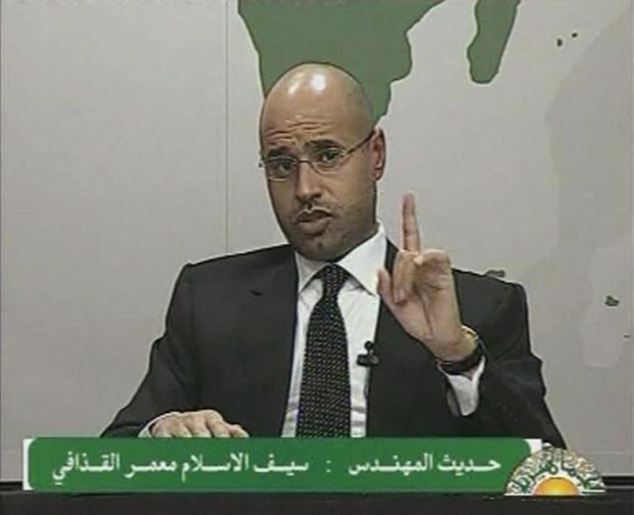
Defiant: Saif al-Islam, son of Libyan leader Muammar Gaddafi, said he would would enforce security at any price as unrest continues
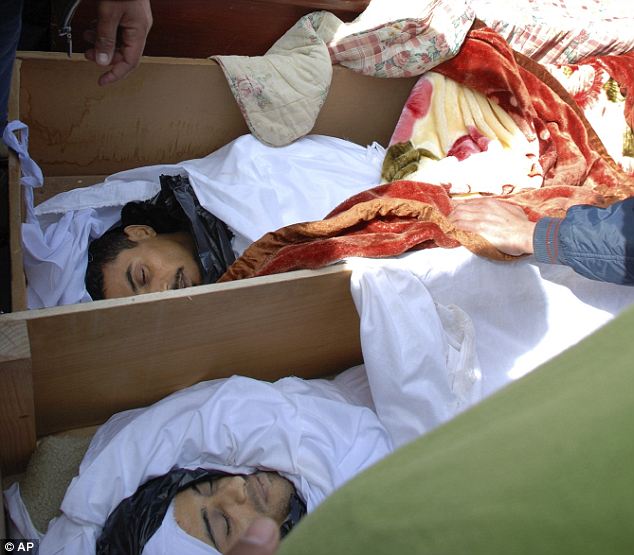
Massacre: More than 300 pro-democracy demonstrators have been killed in Libya
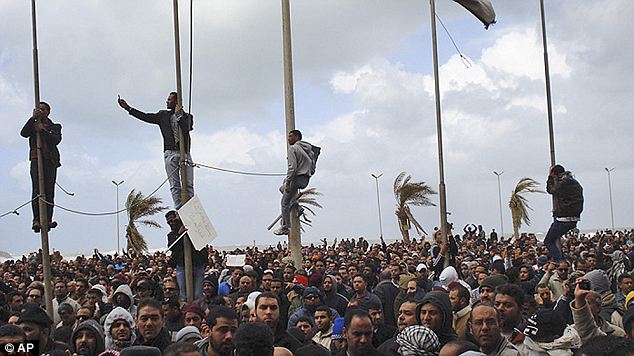
Mass movement: Protesters assemble in Benghazi as the fighting continues
More than 300 victims have been massacred many by foreign mercenaries during the government crackdown in Libyas second city, Benghazi.
Protesters were gunned down in the streets, with reports that helicopter gunships and snipers were used to suppress the uprising.
The state TV headquarters in the capital Tripoli were also damaged during protests on Sunday while the AFP news agency reported several public buildings had been set alight.
Saif al-Islam Gaddafi, the dictator's son, gave a defiant address on state television last night saying his family's 'spirits are high' and warning: 'We will eradicate them [enemies] all'.
He said Libya's oil reserves would be 'burned by thugs, criminals, gangs and tribes' and said the populace would be left in poverty.
Libyan protesters and security forces battled for control of Tripoli's city centre overnight, with snipers opening fire and Muammar Gaddafi supporters shooting from speeding vehicles, witnesses have said.
The protests appear to be the heaviest in Libya's capital after days of deadly clashes in eastern cities.
'FIGHT UNTIL THE LAST BULLET'
The son of Colonel Gaddafi warned that continued anti-government protests could lead to a civil war that could send Libya's oil wells up in flames.
Appearing on Libyan state television after midnight on Sunday, Saif Gaddafi said the army still backed his father, although he added that some military bases, tanks and weapons had been seized.
'We are not Tunisia and Egypt,' the son said.
'We will fight to the last minute, until the last bullet.
'We will keep fighting until the last man standing, even to the last woman standing...We will not leave Libya to the Italians or the Turks.'
He acknowledged that the army made mistakes during protests because it was not trained to deal with demonstrators.
But he added that the number of dead had been exaggerated, giving a death toll of 84.
Saif Gadhafi offered to put forward reforms within days that he described as a 'historic national initiative' and said the regime was willing to remove some restrictions and begin discussions for a constitution.
He offered to change a number of laws, including those covering the media and the penal code.
Three witnesses say protesters moved into Tripoli's central Green Square and nearby squares last night. Plain-clothes security forces and militiamen attacked in clashes that lasted until dawn.
One witness said snipers opened fire from rooftops. Two others said gunmen in vehicles with photos of Col Gaddafi sped through, opening fire and running people over. The witnesses reported seeing casualties, but the number could not be confirmed.
It has also been reported that 17 were wounded when Libyans stormed a South Korean-operated construction site 18 miles from the capital, with two Bangladeshi workers stabbed.
BP says it is 'very likely' some of the oil company's employees in Libya will be evacuated in the coming days as the violent unrest in the north African country spreads.
A spokesman for BP PLC said the company is drawing up plans for evacuating staff 'in the next couple of days'.
BP has about 140 employees in the country, of which less than a third are expatriates, spokesman David Nicholas said.
British Prime Minister David Cameron, as he flew into Egypt on a surprise visit, launched an angry attack on the treatment of protesters in Libya.
Our message, as it has been throughout this - I think we have been extremely consistent in saying that the response to the aspirations people are showing on the streets of these countries must be one of reform not repression,' he said.
We can see what is happening in Libya which completely appalling and unacceptable as the regime is using the most vicious forms of repression against people who want to see that country - which is one of the most closed and one of the most autocratic - make progress.
The response they have shown has been quite appalling.
The worst unrest of Gaddafis 41-year rule comes seven years after Tony Blairs controversial Deal in the Desert, when the Labour Prime Minister ushered Libya in from the cold in exchange for billions in British business deals.
Britain has faced growing condemnation over its courting of Gaddafi after the Libyan dictator ordered the slaughter of hundreds of his own people.
The United Nations and the U.S. Ambassador to London questioned the UKs cosy trade links with Tripoli yesterday.
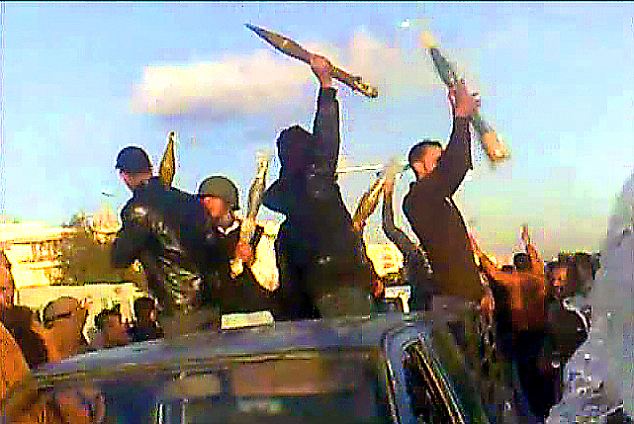
Firepower: Guns and rocket grenades on the streets of Benghazi yesterday
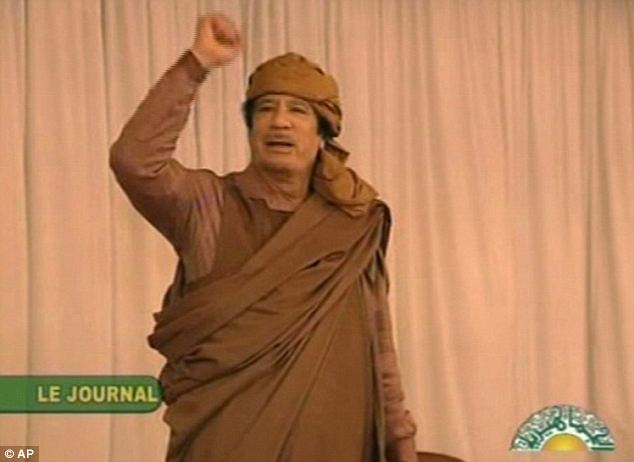
Iron fist: Colonel Gaddafi, appearing yesterday on state television, is accused of ordering the slaughter of his own people
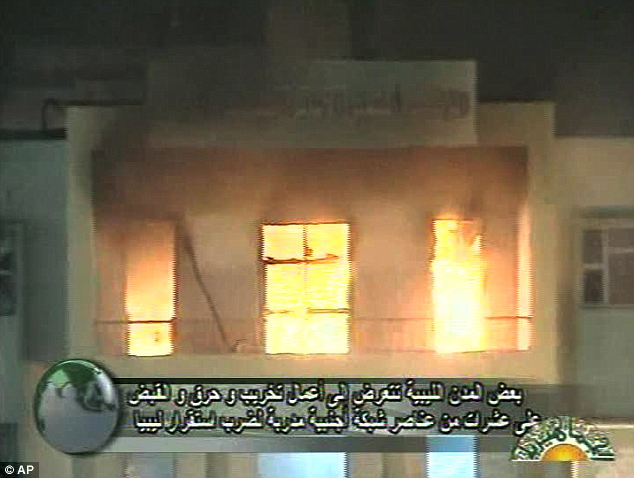
City on fire: Al-Bayda local council building ablaze in Libya's third biggest city Al-Bayda
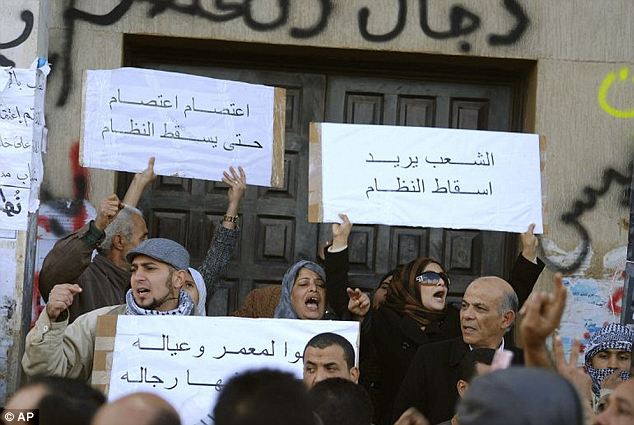
Call for change: Placards in Arabic read at top left 'Strike, strike until the fall of the regime', and at top right 'The people want to topple the regime'
British weapons are believed to have been used to murder more than 300 Libyan pro-democracy demonstrators.
Relatives of those killed during the Lockerbie massacre condemned the shameful British dealings with Gaddafi.
And Mona Rishmawi, legal adviser for the UN High Commission on Human Rights, warned that Britain might be guilty of complicity in the killings.
Since sanctions were lifted in 2004, UK firms have sold sniper rifles, tear gas, wall-breaching projectile launchers and crowd control ammunition to a regime found guilty of ordering the Lockerbie bombing, Britains worst terrorist atrocity.
It paved the way for the near doubling of exports to Libya, worth almost £500million in 2009 alone.
Mr Blairs deal is widely seen as having paved the way for the controversial release of Lockerbie bomber Abdelbaset al-Megrahi.
SILVER PRICES SOAR TO 30-YEAR HIGH AFTER MIDDLE EAST UNREST
Silver has risen to its highest price for more than 30 years as investors exploited the growing upheaval in the Middle East.
Cash silver rose by 1.5 per cent to $33.1425 an oz, its highest price since March 1980, while gold bullion was up its highest level in seven weeks.
'Gold, silver, platinum and palladium are all riding on investor interest against the backdrop of intensifying violence in the Middle East,' said KEB Futures Co trader Hwang Il Doo told Bloomberg.
'I wouldnt be surprised to see gold rising above $1,500 in the coming month.'
The price rises follow a warning from Gaddafi's son that civil war would jeopardise Libya's oil wealth.
But critics point out that the murder of WPC Yvonne Fletcher, shot dead in London by a Libyan diplomat in 1984, has still gone unpunished.
Foreign Secretary William Hague revoked all trade licences to the regime on Saturday.
Today he said the Libyan ambassador would be summoned to the Foreign Office to be told 'in the strongest terms our absolute condemnation of the use of lethal force against demonstrators'.
He said that Britain was calling an immediate immediate end to the violence and the killing of protesters, and for all parties to act in 'a restrained and humane manner'.
There should be a full investigation into the events in Benghazi and eastern Libya with a commitment that those responsible will be held accountable.
'The world is watching Libya, with mounting concern,' Mr Hague added.
'The Libyan government should be in no doubt that it will be held accountable by the international community for its actions.
'The Libyan government's refusal to recognise the extent of their people's concerns and disregard for their safety undermines their credibility. The Libyan government must take responsibility for the safety of its people.'
French government spokesman Francois Baroin said today the international community must do everything it can do prevent Libya sinking into civil war,
'We're extremely worried and shocked and we strongly condemn what's happening, this unprecedented violence, which could descend into an extremely violent and lengthy civil war,' Mr Baroin said in an interview on Europe 1 radio.
'The repression has begun and everything must be done at diplomatic level to coordinate the American and European positions to prevent something drastic happening.'
France's European Affairs Minister Laurent Wauquiez said French nationals in Libya are urged to leave the country and added French schools there would be closed immediately.
The United States said it was weighing 'all appropriate actions' in response to the unrest.
'We are analysing the speech ... to see what possibilities it contains for meaningful reform,' a U.S. official told Reuters.
Today in Brussels Mr Hague will urge other European leaders to voice their condemnation.
As recently as January 28, the Governments UK Trade and Investment body was trumpeting business opportunities in Libya.
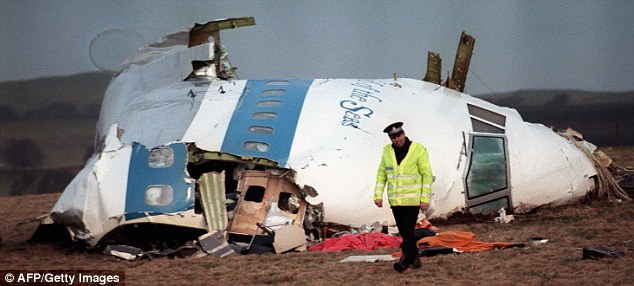
Criticised: The British government has been accused of poor decision
making after releasing Libyan Abdelbaset al-Megrahi, the Lockerbie bomber

Unhappy: Daniel and Susan Cohen, who lost their daughter Theodora in the 1988 bombing, believe that the British government have blood on their hands
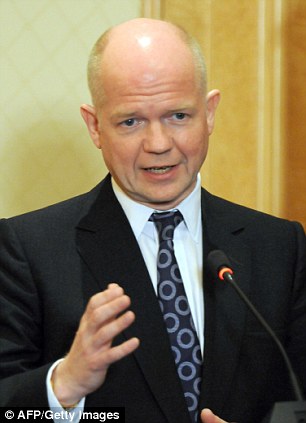
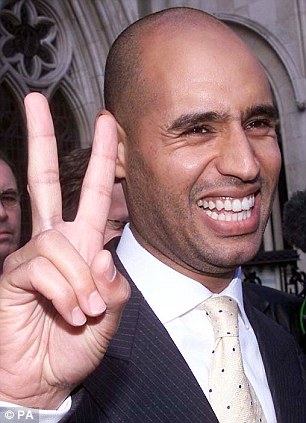
Condemned: British Foreign Secretary William Hague (left) called Saif Gaddafi (right) to express his alarm at the bloodshed. Hague will ask other European leader countries to condemn the violence in Libya
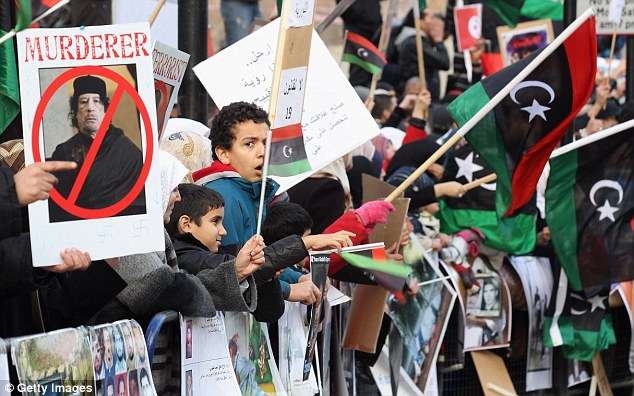
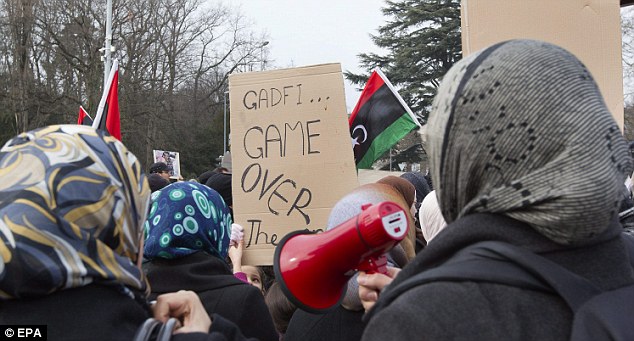
Game over: Protesters demanded that Gaddafi stop the bloodshed and relinquish his position
At least 150 British firms operate in Libya, including British Airways, Bhs, Marks & Spencer, Monsoon Accessorize, HSBC, Corus International, KPMG, GSK, AstraZeneca, JCB, Rentokil, Ernst & Young, PWC, Land Rover, Mott MacDonald, AMEC and Biwater.
BP landed a £1.3billion gas and oil deal and a further £545million project to drill for oil.
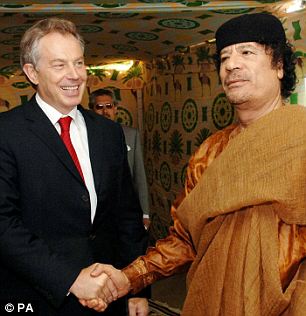
Risky ally: Former British prime minister Tony Blair did a deal with Colonel Gaddafi back in 2004
Shell is also a huge investor in the country and British imports of Libyan oil have topped £1billion in recent years.
More...
- Middle East uprising will put oil giant Saudi Arabia in peril, claims historian
- Stripped, punched and whipped with flag poles: Full horror of Lara Logan's attack emerges
- China rounds up activists to rapidly quash pro-democracy 'Jasmine Revolution' organised online
- MICHAEL BURLEIGH: What price will we pay for Blair's sordid Faustian pact?
- Libya 'uses mercenaries' to keep order on streets as 200 die in violent clashes
We are very concerned about any possibility of complicity in human rights violations, she said.
Louis Susman, the U.S. Ambassador to London, told BBC1s Andrew Marr Show: I would suggest that to deal with [Gaddafi] to give him greater stature, greater ability on the world front to look like he is a good citizen is a mistake.
Susan Cohen, whose student daughter Theodora died in the Lockerbie bombing, said Britain must share some of the blame for the massacre in Libya.
This is what you get for appeasement, she said. The dreadful bloodshed we are seeing on the streets of Libya is in part due to the disgusting behaviour of the British government.
Lucinda Lavelle, secretary of the British Libyan Solidarity Campaign, said Britains whole process of rapprochement with Libya was based on a false premise.
Now we have all the evidence we need Gaddafi has not changed one iota, she said. He is still a vicious, brutal dictator who will murder anybody who stands in his way.
A spokesman for Tony Blair said he was shocked and appalled by the violence in Libya and continues to urge a political process of change.
As unrest continues across the region, Yemen's president rejected demands that he step down and said Monday that the widespread demonstrations against his regime were unacceptable acts of provocation, though he renewed calls for talks with the protesters.
After a week and a half of marches that have left nine dead, President Ali Abdullah Saleh told a news conference that he ordered the army to fire at demonstrators 'only in case of self-defence'.
Saleh has ruled the poorest of the world's Arab countries for three decades but the widespread demonstrations are putting heavy pressure on the U.S. ally.
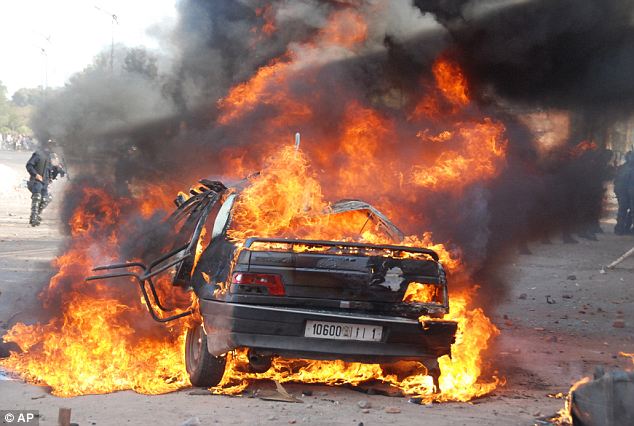
A region in turmoil: A burning car during a demonstration in Marrakech in one of a string of nationwide protests that brought thousands to the streets across Morocco
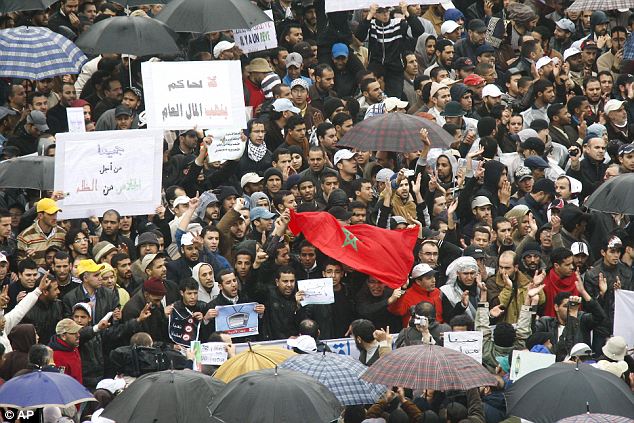
Moroccan march: Thousands mass in in the capital Rabat on Sunday
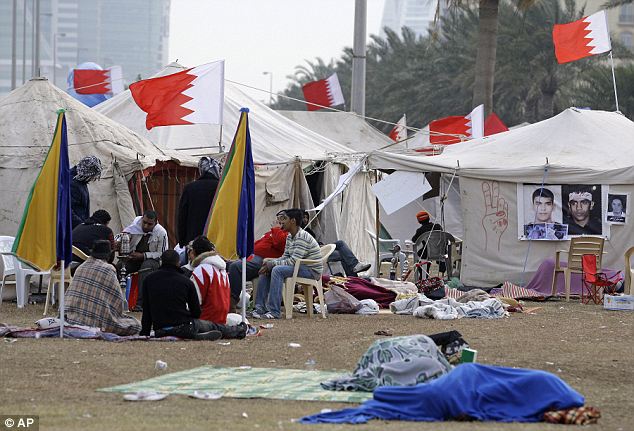
Ongoing protest: Bahraini anti-government demonstrators sleep outside their tents after nearly a week of unrest
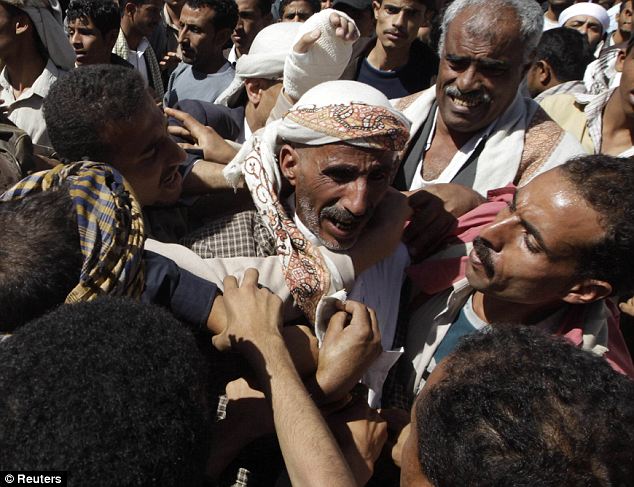
Yemeni protest: Anti-government demonstrators surround a government backer as they scuffle with him during a protest in Sanaa
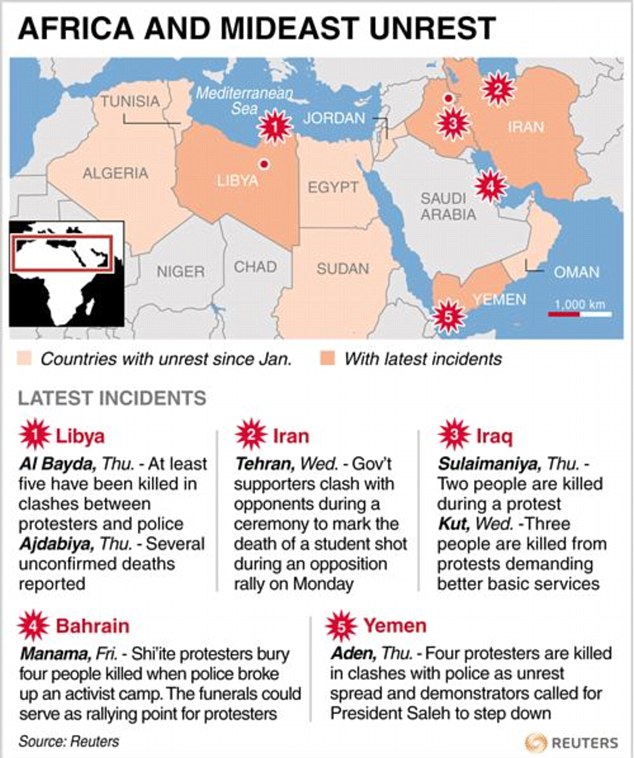
Brute who surrounds himself with beauty
Profile by John R Bradley
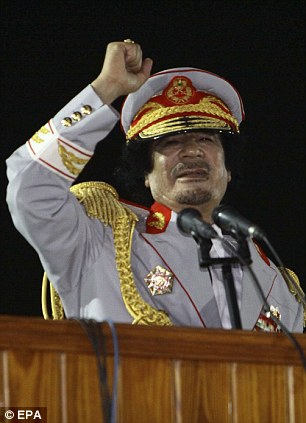
Charismatic and wildly unpredictable: But Gaddafi has managed to stay aloof up until now
While the deaths in Benghazi are deeply shocking, they are absolutely in line with the brutal regime that has kept Muammar Gaddafi in power for over 40 years.
This is a country where more than 1,200 prisoners at Tripolis notorious Abu Salim prison are believed to have been massacred in a single month in 1996.
And where, more recently, there have been regular reports of prisoners being tortured, whipped, raped and executed without a fair trial.
Blocking social networking sites and suspending internet services, as the Libyan authorities have done over recent days, is nothing for an increasingly oppressive regime which tortures those who speak their mind freely and keeps an iron grip on the media.
But whatever the brutalities handed out by his army and secret police, Gaddafi has until recently always managed to remain aloof.
Charismatic and wildly unpredictable almost to the point of madness this is a man who clearly loves the company of beautiful young women (as illustrated by the 40 beauties of the notorious Amazonian Guard who act as his personal bodyguards) and yet leads one of the most conservative Islamic states in the Arab world.
That contradiction could prove to be a leading cause of his downfall.
The members of the Amazonian Guard have to be virgins. These brutal beauties are reportedly trained in martial arts and the use of firearms at a special academy, where they are turned into lethal and blindly loyal killers.
Gaddafis conflicting passions for women and for Islam were typified on a state visit to Italy in 2009 when having hit the headlines by paying 500 of Italys most beautiful models to attend a party he confounded expectations by simply handing each of them a copy of the Koran and a signed copy of his famous Green Book, setting out his political philosophies and beliefs.
Although difficult to pin down, these can be described as a sort of Islamic socialism.
The book is studied in Libyas schools and universities and is central to a cult of personality almost akin to brain-washing.
Until this weeks demonstrations, Gaddafi had hoped it would propel his favoured second son, Saif, into power at some point.
Gaddafi couldnt be any more unpopular in his own country than he is now but that certainly wasnt always the case.
When, as a 27-year-old Army captain, he led the military coup which deposed Libyas King Idris in 1969, it was so on a wave of popular support. And for the best part of two decades he stayed popular, using the profits from Libyas oil fields to improve education, healthcare and infrastructure.
In a huge country the fourth-largest in Africa rich in oil and minerals and yet with a population of no more than 7million, improving overall living standards wasnt too difficult for a while.
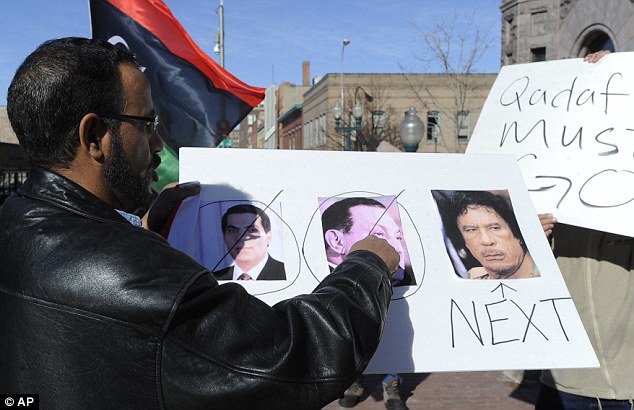
In line: A protester plays prophet and predicts the fall of Colonel Gaddafi
The United Nations trade sanctions, however, declared in 1992 after Libya was accused of being involved with the 1988 Lockerbie bombing, changed all that.
Unemployment is near 30 per cent in some regions and poverty is widespread. The ruling elite has become corrupt and remote, and Gaddafis regime has become ever harsher to keep him in power.
Libya today is a very dangerous place, where human rights abuses have become commonplace.
Just as in Egypt and Tunisia, ordinary Libyans are now rebelling against this sort of autocratic dictatorship.
The crucial difference here, though, is that Libyas police and armed forces fiercely loyal to their leader wont stand idly by.
Gaddafi might yet go but not without considerably more blood being spilt.
Kanal Gaddafi itabidi naye aachie ngazi kama walivyo achia Viongozi wa Misri na Tunisia sasa zamu ya Mzee Gaddafi kuachia ngazi taratibu........... :clap2: